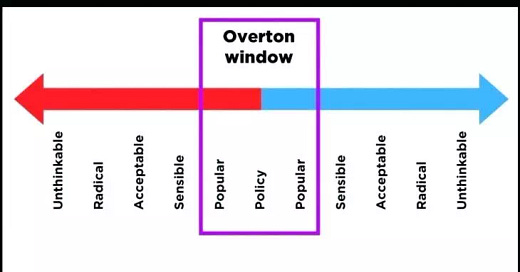Opportunities in the Vibe Shift
On how the Church might start responding to our quickly shifting ground
If you aren’t sensing the massive change happening in American culture, what many are calling a vibe shift, you either aren’t paying attention or you aren’t online (and if you aren’t at all online, there is a sense that you are choosing to not pay attention).
Now I’m all for people unplugging, but I also think it’s important for us as Christians and especially as clergy to know what’s going on. Things are shifting beneath our feet, morally, spiritually, politically, and socially—and it’s hard to tell where we will end up. For many years I have felt a bit pessimistic about the future of the Church, especially in America, and have wondered if I would spend my ministry working and passing down the faith in a culture that mostly rejected the word of God. Many Christians historically have been called to that very difficult, faithful task. But I’m sensing a change in the wind, aren’t you? Hard to put your finger on it, but you can feel it. And I’m wondering if there are new opportunities for the Church that we don’t want to miss.
And so, I wanted to list out where I see this vibe shift happening and what we might make of it as Christians. What follows is a simple list of what I’m sensing in my own context, sketches really, and some thoughts on what these changes might mean for Christians in North America.
The Shift: Politically, Anything Seems Possible
The Opportunity: A Bolder and Wiser Political Imagination
In politics, we have the phenomenon of Trump smashing open the Overton window (the accepted parameters of political ideas that are on the table), as he is both stoking and riding the wave of massive discontentment with the status quo. Whether this will end up being a good thing or a bad thing will depend very much on what the new administration is able to get accomplished, and on the level of restraint we see from a famously impulsive character. Anything seems possible at the moment, a notion hopeful to those who like Trump, and scary to those who detest him. But to miss the sense of possibility in the current political moment, is to miss where the culture is at—there is a yearning to see and enact real change after decades of stagnation and frustration. We’ll see if any meaningful, positive change happens.
For the American Church, I think it’s a good opportunity to reflect on the mistakes of the past when it comes to political engagement. There are times when we have been overly quiet in politics, and other times when we’ve been far too embroiled in politics and lost our bearings. We should be honest about these things, and repent of them.
But this shift in the culture is also a chance to discover anew how to speak boldly as preachers and teachers without speaking bitterly; how to call out injustice and sin when we see it, without being captured by partisan tribalism; how to publicly imagine how our communities might become better, without falling prey to the temptations of false utopias. It’s a tough task.
Figuring out how to advocate for biblical principles and values in the political system, without being captured by that system or by a particular party, to me is an important priority for today, a new chance for the Church to get it right. I haven’t exactly mastered how to do that in this current moment, but putting forward a new way to be political as Christians seems to me an urgent opportunity, especially in a time when people are open to new ways of doing things.
The Shift: Materialism and Atheism Seem Passé and Unsatisfying
The Opportunity: A New Receptiveness to the Gospel
Christopher Hitchens is dead, Richard Dawkins is a living relic of the past, and the angry and popular movement of New Atheism that was so strong in the early 2000s has essentially been extinguished. Instead, we are seeing famous, outspoken atheists and skeptics (such as Ayaan Hirsi Ali and historian Tom Holland) becoming believing or at least “cultural” Christians (a story told brilliantly by Justin Brierly in his podcast). And those figures I believe are representative of a new openness to the gospel.
The answers one gets from a materialist, atheistic worldview are not satisfying to the questions people are asking about meaning, morality, consciousness, and the basic sense we have of what it means to be a human being. As Christians, we need to rediscover our courage and conviction that what we believe is logical, historical, true, and hopeful (Christian apologist Wes Huff on the Joe Rogan podcast offered a great example recently of how to do this with insight and grace). Materialism does not adequately account for our experience of the world, and there is a great hunger for something, anything that does. I think Rod Dreher is right in sensing that we are in a season of re-enchantment, and if people do not seek it in Christianity, they will seek to fill that hunger in darker spiritualities.
The Shift: Christian Revival is happening in Gen Z and younger
The Opportunity: Not Miss Out on What God is Doing
We have signs of genuine revival happening on our college campuses (it’s increasingly clear that the Asbury Outpouring was a firstfruits of revival to come; see this report about a revival happening by my alma mater UK in Lexington, KY just recently). This revival is mainly coming in areas and ministries that are deeply rooted in prayer, the Bible, the orthodox Christian faith, and a genuine hunger for salvation that only Jesus can offer. God clearly is doing a new thing in this generation, and to miss that would be to miss possibly the greatest opportunity for Christ we see in our lifetime. I pray that we become churches that plant seeds for and welcome revival, by the work of prayer and discipleship and proclamation. This should be our central work and the great passion of the Church in the coming years.

The Shift: Many men and women are frustrated and wounded in their sexual lives, and looking for better alternatives
The Opportunity: Show that the Christian Sexual Ethic is the best thing that’s ever happened to women and children (and is good news for men too)
We see a culture sunk in sexual chaos, one without clear rules and expectations, unmoored from the wisdom of religion and philosophy and the very basics of human biology. We are living over half a century after the sexual revolution of the 1960s, and that revolution’s grandchildren are addicted to porn, sexually frustrated in their embodied relationships with each other, are unhappily cohabitating rather than getting married, and have been left without the wisdom and experience to navigate this most central, beautiful, and yet quite difficult aspect of human life. As the church, we should have an enormous amount of empathy for those who are broken, hurting, and confused in their sexual lives.
The sexual revolution of the 1960s was a revolt against the biblical, Christian sexual ethic (that sexuality is a gift from God to be enjoyed exclusively in a marriage between one man and one woman). It was thought then (as it still is by many now) to be liberating to be unrestrained from the limits imposed by marriage and to enjoy a kind of freedom to do what you will in your sexual life, as long as everyone involved were consenting adults. But, as it turns out, a lot of people, particularly women and their children, don’t feel liberated by our culture’s permissive sexual culture and have been quite damaged by the false idea of “casual sex.” Many people, religious and secular alike, are questioning the wisdom of the sexual revolution and are seeking a better alternative (secular author Louise Perry makes this argument in her book, The Case Against the Sexual Revolution).
Obviously this is a bigger topic than I can handle in this article, but the Church has an opportunity to remind the culture that the Christian sexual ethic is the best thing that has ever happened to the welfare of women and children, and also happens to be one of the best means of channeling the sexual drive of men in a positive direction. We have an opportunity in this environment to unflinchingly, gently, and joyfully tell people how the gospel of Jesus brings freedom and joy in our sexual lives.
The Shift: Decadence in the Arts (or, Movie Stars and Rock Stars All Seem Old and Lame)
The Opportunity: Offer Beauty in an Ugly World
We have a great stagnancy in the arts, where everything is a remix or a remake, and nothing feels genuinely new. What once seemed fresh and transgressive now feels old, stale, and corporate (SNL’s 50th anniversary was probably the best example of this—here were some of the richest, wealthiest, most influential people in the world, who still want to believe that they are artistic underdogs fighting the Man).

Substacker Ted Gioia is the most insightful critic writing today of the decline of the arts, particularly the music scene—his suggestion that we are living in the dopamine culture is one that I think about constantly, as I struggle to find any new music, movies, or books that seem fresh and inspired.
The Church has a great chance here to invest in the arts, as it has historically done, in order to draw people through beauty to delight in the great Artist, the Creator himself. Instead of doing bad imitations of popular culture, Christians should become re-rooted in our own artistic traditions, and from those wellsprings speak a new, beautiful artistic word into the culture (poet Malcolm Guite lives as a wonderful example of how to do this well).
The Shift: Technology is No Longer Exciting, It’s Scary
The Opportunity: Offer Analog Wisdom and Limits to our Digital Lives
While new technology once brought awe and excitement (think Steve Jobs announcing the iPhone), it now brings fear and dread. Instead of relieving us from burdensome tasks, the new technological breakthroughs have brought us more anxiety, shorter attention spans, and increasingly make us feel irrelevant and unsure of our place in the world as human beings (AI of course being the supreme example of this).

As Christians, we believe that our bodies are more than machines for our brains, unlike what some transhumanists would like us to believe. Rather, we are creatures, and our bodies are a gift from God, to be cherished and cared for as temples of the Holy Spirit. To a world that has become scarily disconnected from the earth and from reality itself, Christians can offer a hopeful, joyful word that the body is in fact good, and that no human is ever replaceable. We can bring a prophetic word that just because a technology is new, that does not mean we should choose to use it. Paul Kingsnorth offers a great example here, insisting that we live as followers of Jesus in resistance to what he calls the Machine. We have an opportunity to offer a grounded, analog resistance to our digitally colonized lives—indeed, here we might have our greatest opportunities to be the light of the world, especially in the days to come.
These are just my own observations on what I’m seeing and hearing and thinking about in these interesting days. What are you seeing and sensing? What have I missed? Let me know.
If you enjoy my Substack, consider buying me a coffee!








